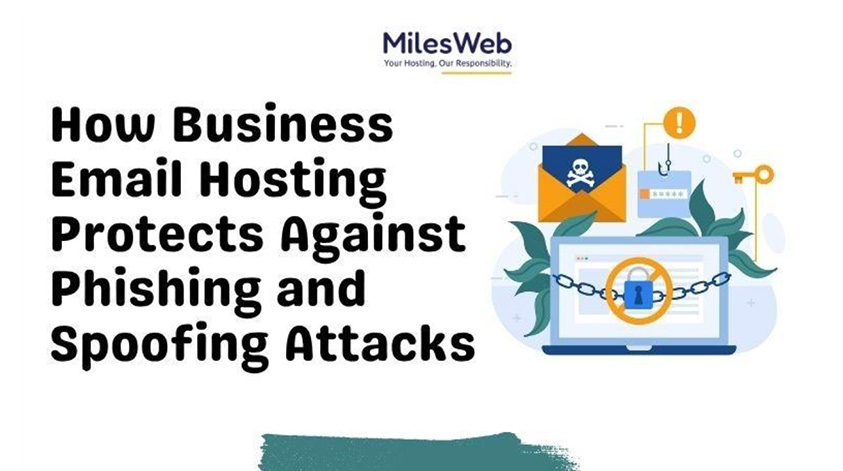Emails are greatly utilized as a tool in business communication and, unfortunately, the most abused. Users get email for business, but data and money theft from phishing, spoofing, and fraudulent communication attacks disguised as fake invoices and urgent CEO requests have greatly evolved.
Even when you register for the cheapest domain name, your domain-oriented email services will increase business security and self-reputation. Let’s look into it as to how.
1. Understanding Phishing and Spoofing
The terms “phishing,” “spoofing,” and other fraudulent communication attacks can easily be defined, and oversimplified definitions can minimize their overall impact. Elicit and deceive phishing attacks to gain sensitive information like account passwords and credit card information, and also use fake websites. Spoofing attacks are more premeditated, as these target the dispossessed to fabricate the sender of the communication to look like a trojan company or person to a trusted registrar.
Both of these attacks rely heavily on the human element of trust. The impacts of their combined effects due to loss of trust are devastating and traumatizing, including loss of sensitive information, loss of finances, and a reputation that can be lost in a second and be permanently disfigured for years.
2. Why Free Email Services Aren’t Enough
Free or shared email services may be convenient, but they offer little in the way of enterprise-grade protective measures. While very basic spam filtering is provided, they do not include deep-level authentication or domain-level control.
For businesses, this is a problem. To cybercriminals, your brand domain is just another target to be used to send deceptive emails to your clients or employees. When this occurs, your reputation—not the cybercriminal’s—suffers the consequences. This is where business email hosting can help.
3. Advanced Authentication Protocols (SPF, DKIM, DMARC)
The most advanced business email hosting services offer authentication protocols that render impersonation virtually impossible.
- SPF (Sender Policy Framework): Ensures that only authorized servers send emails on behalf of your domain.
- DKIM (Domain Keys Identified Mail): Attaches a digital signature to outgoing messages to ensure they haven’t been altered in transit.
- DMARC (Domain-based Message Authentication, Reporting & Conformance): Collaborates with SPF and DKIM to authenticate emails and to reject or quarantine those that are not.
These protocols in place offer a digital trust framework that verifies the source of any email. A hacker attempting to send fraudulent emails in your domain will be identified and blocked.
4. AI-Powered Spam and Threat Detection
Phishing attacks are more sophisticated than the old “Nigerian prince” scams. Modern attackers employ personalization strategies, cloned websites, and even AI-generated content.
That is why business email hosting has AI-powered spam filters and live threat detection tools. These systems analyze the headers, attachments, and links of emails and learn from new attack patterns to identify and quarantine potentially dangerous emails before they arrive in your inbox. This means more accurate results, reduced risk, and most importantly, easier everyday use.
5. Management of Domain Reputation
Domains may become blacklisted if they are used wrongly for malicious activities. Once the domain is blacklisted due to malicious acts, legitimate emails sent from that domain will start landing into users’ spam or junk folders, causing loss to the business.
With the introduction of business email hosting, you can maintain the reputation of your domain. It will make sure that emails being sent from your domain are accepted by the servers, keep track of abuse reports, and make sure that your domain is authenticated and not being misused.
By abusing reputation management, hosting makes sure that your reputation as a sender is legitimate, which clients, customers, or third parties will trust.
6. Centralized Admin Controls and Security Policies
More control and means for policy enforcement are granted to the administrator under professional hosting when compared to personal or free emails.
- Multi-Factor Authentication (MFA) for every single account
- Password policies, reset policies, and password strength
- Suspicious login control
- User control for sensitive data
With centralized management, it ensures that the compromise of one account will not bring the whole business network down, which is a defense against phishing attacks.
7. Backup and Compromise Recovery
Even with the best safeguards in place, the risk of human error must be accounted for. Employees may still click on harmful phishing links or download compromised attachments.
Every instance of managed business email hosting is provided with Backup and Recovery features. These features drastically reduce the time lost during operational downtimes and allow the rapid restoration of any lost or corrupted information. This ensures that your operations continue seamlessly, even after a phishing attack.
The Final Word
Inattentive users and weak systems are what allow phishing and spoofing to succeed. Business email hosting solves both of these issues simply by protecting your domain, authenticating email senders, encrypting communications, and giving unrestricted control to your admins.
In an era where a single fake email can result in millions of losses, the difference it makes to your email domain, and by extension your business, cannot be overstated. Transformative secure business email hosting is an absolute necessity.
And as India’s businesses increasingly venture out, selecting a Made-in-India hosting provider like MilesWeb keeps your emails and your reputation safe in local hands with global-grade reliability.


